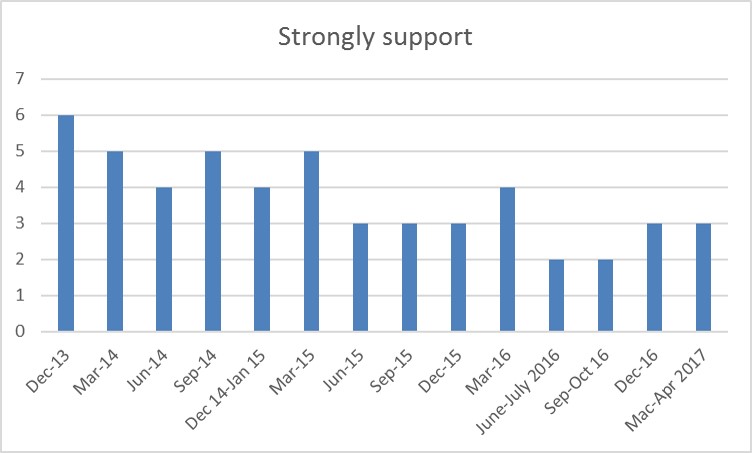
The latest findings from the government’s quarterly survey of attitudes to fracking shows levels of support continue to lag behind opposition but the gap appears to be closing.
The survey, published this morning, puts support at 19%. This is one percentage point up on the previous survey and the second consecutive rise. But current levels of support remain 10 percentage points below the peak.

Opposition now stands at 30%. This is down a point on the previous survey and the second fall since the peak in opposition of 33% in September-October 2016.

The Wave tracker survey for the Department for Business, Energy and Industrial Strategy (BEIS), puts the gap between support and opposition at -11%, a continuing fall since the biggest difference of -16% in autumn 2016.

The survey saw rises in the proportion of people who said there was a need to use all available energy sources and that fracking would be good for local jobs. The most frequent reason people gave to oppose fracking remained loss or destruction of the natural environment. The survey also saw large rises in people who felt fracking was not safe or opposed it because of the use of chemicals.
The latest survey is the first since work began on Cuadrilla’s shale gas site at Preston New Road near Blackpool.
The proportion of people who strongly support fracking has remained stable at 3%, while the proportion who strongly oppose rose one point to 12%.


The proportion of people who neither support nor oppose remained unchanged from the previous survey at 49%. The proportion of people who said they didn’t know what they felt about fracking or shale gas fell one percentage point to 2%.

Awareness
Awareness of fracking has remained fairly constant since December 2013, with about three-quarters of participants saying they knew about the process.

The survey recorded the lowest figure so far (10%) of people who said they knew a lot about fracking. The proportion who said they knew a little about it was 46%, the highest figure recorded so far. About a quarter of participants said they had never head of fracking or shale gas.
BEIS said awareness of fracking was higher for those in social grade AB (90%), aged over 55 (87%), with incomes over £35,000 (88%), and home owners (85%).
Reasons for support

- Need to use all available energy sources – 35% (up from 27% in December 2016)
- Reduces dependence on other fossil fuels – 28% (up from 27%)
- Reduces dependence other countries for UK’s energy supply – 31% (down from 33%)
- May result in cheaper energy bills – 27% (up to 20%)
- Good for local jobs and investments – 30% (up from 23%)
- Will have a positive impact on the UK economy – 21% (down from 23%)
- Will have positive impact on climate change/meeting carbon reduction targets – 10% (unchanged)
Reasons to oppose

- Loss/destruction of natural environment – 56% (down from 58% in December 2016)
- Risk of contamination to water supply – 32% (up from 27%)
- Too much risk/uncertainty to support at present – 29% (up from 23%)
- Risk of earthquakes – 29% (up from 20%)
- Not a safe process – 32% (up from 19%)
- Use of chemicals in the process – 24% (up from 16%)
- Should focus on developing renewable energy – 20% (up from 15%)
- Negative impact on climate change/meeting carbon reduction targets – 18% (up from 17%)
- Should focus on developing other energy sources – 15% (up from 9%)
Methodology
The data for the survey – Wave 21 – was collected between 29 March and 2 April 2017 using face-face in-home interviews with a representative sample of 2,180 households in the UK.
Links
Survey details, summary and data set
Categories: Research


Lancashire County Council election results:
http://www3.lancashire.gov.uk/elections/results/2017/howitstands.asp
Conservatives have an overall majority now (46 seats). labour 30, LibDem 3, Independents 2 (are these anti fracking candidates?), Greens 1, UKIP 1. How does this fit with most people in Lancashire don’t want fracking? Greens 1 only???? And she is from Lancaster area.
Nationally – With all council seats now declared, the Conservatives have gained control of 11 councils and have increased their number of councillors by 558 – the only major party to increase their seat total.
Labour, in contrast, have lost more 320 councillors while UKIP one just one seat, losing 114.
The Conservatives have also knocked Labour into third place in Scotland, gaining more than 100 councillors there compared to 2012.
The new Planning Committee for Lancashire County Council will now be controlled by the Conservatives….
Sort of fits in with this article and Martin’s comment:
“So-70% either support or have no opinion either way. Only 30% oppose.”
So only 19% support whilst 81% oppose or have no opinion either way.
19% support. Three years ago it was 29%
30% oppose. Three years ago it was 22%.
The trend looks clear to me.
Over the last 3 years support has fallen by over a third, whilst opposition has increased by over a third.
The ‘gap is closing’ headline is a poor attempt at putting a positive spin on a clear move away from support and towards opposition.